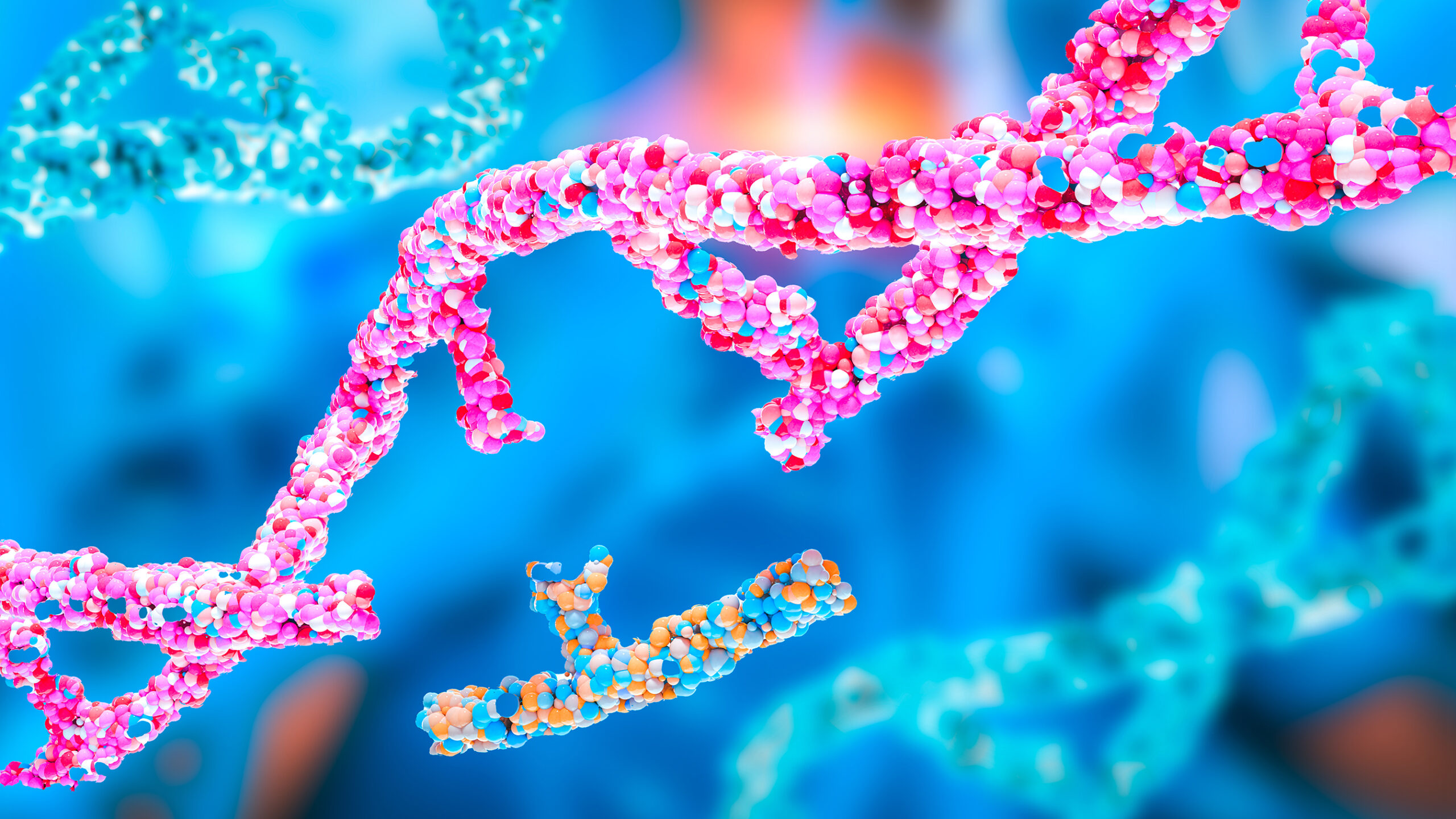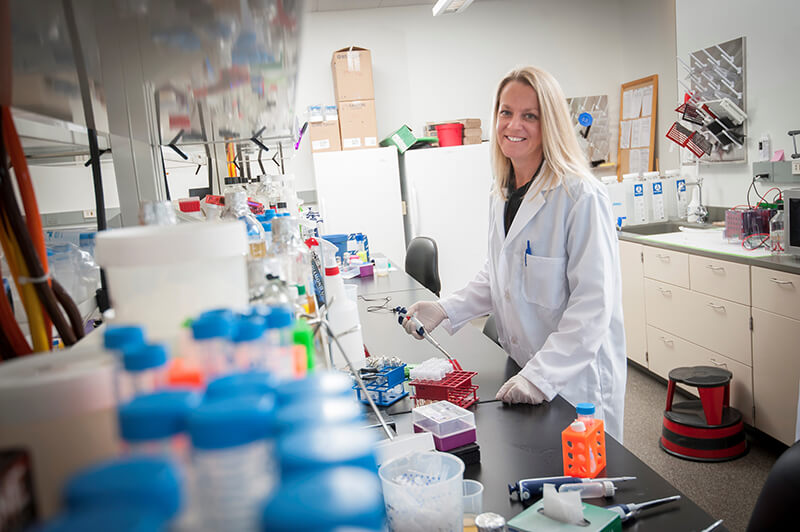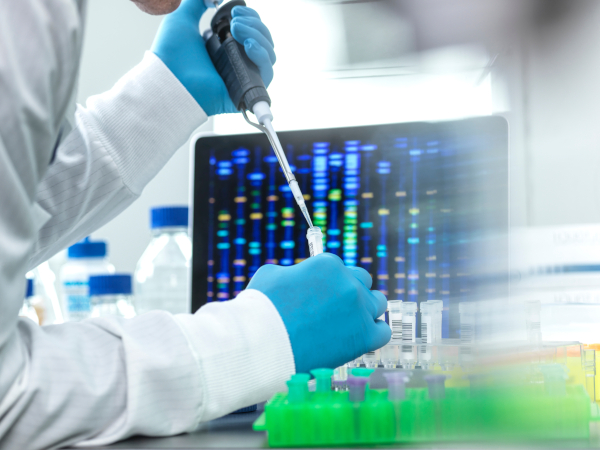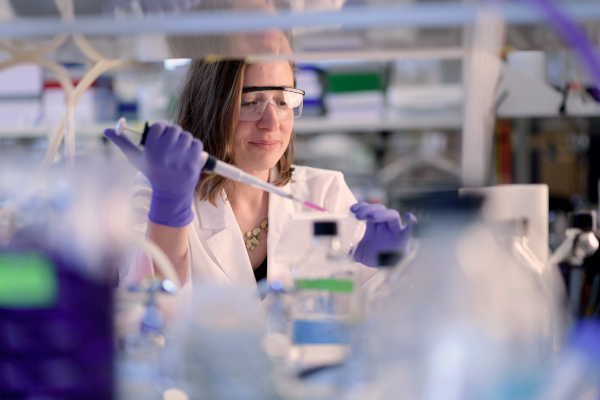impact area
Personalized Medicine
The Purdue Institute for Cancer Research (PICR) is at the forefront of advancing personalized medicine, leveraging interdisciplinary expertise to tailor treatments to the unique genetic and molecular profiles of individual patients. By integrating cutting-edge research in genomics, proteomics, artificial intelligence and computational biology, PICR aims to improve cancer care through precision-based approaches.

designed to be precise
Improving cancer care through precision-based approaches
Personalized medicine, also known as precision medicine, is an innovative approach that tailors medical treatment to the specific genetic and molecular characteristics of both the patient and their cancer. By understanding genetic differences, this approach represents a shift away from the traditional “one-size-fits-all” treatment, aiming to improve treatment outcomes and minimize side effects by using therapies that are specifically designed for individuals.
Building on Purdue’s strengths in drug discovery and development, PICR researchers are creating new therapeutic agents that target specific molecular pathways in cancer cells. This precise approach allows for more effective treatments with fewer side effects. Through the development of smart drug delivery systems and molecular targeting strategies, we’re advancing our ability to direct treatments specifically to cancer cells and away from normal cells, thereby sparing healthy tissue.
Chemical and structural biology research at the PICR has yielded next-generation drugs designed to attack cancer. PICR Director Andrew Mesecar is developing patented inhibitors that selectively block USP7, a cancer-driving enzyme implicated in hepatocellular carcinoma. By targeting this enzyme without affecting similar proteins, his work is paving the way for therapies that could be matched to patients whose tumors rely on USP7.
Arun Ghosh, a leader in structure-based drug design and medicinal chemistry, applies precision chemistry to develop enzyme inhibitors with potential applications in cancer. His lab studies compounds inspired by natural products to better understand how to disrupt processes that allow cancer cells to grow. John Tesmer, the Walther Distinguished Professor of Cancer Structural Biology, complements this work by using structural biology to reveal how signaling proteins drive cancer progression. His team is developing small-molecule inhibitors that specifically block these cancer-related pathways, providing new opportunities for therapies tailored to the biology of each tumor.
Philip Low’s ligand-directed therapy platforms have led to FDA-approved treatments like Pluvicto® and Locametz®, which are used in patients whose tumors express specific cell-surface targets such as prostate-specific membrane antigen (PSMA). This targeted approach directs therapy to cancer cells while sparing healthy tissue, giving patients more precise treatment options with fewer side effects. Learn more about Low’s pioneering approach to medicine here.
Biomarkers are measurable biological indicators such as genetic mutations, protein levels, or metabolic changes that provide critical information about a tumor’s characteristics. In cancer research, they help predict how a patient’s disease will progress and how it will respond to specific therapies. By identifying these unique signals, researchers and clinicians can tailor treatments to each patient, a central goal of personalized medicine.
Andy Tao, professor of biochemistry, is developing a simple blood test to detect and monitor cancer. His team identified 144 phosphoproteins in blood plasma that are elevated in cancer patients, making them promising biomarkers for early detection and tracking how cancer responds to treatment or if it returns. Because these proteins are enclosed in stable particles called microvesicles and exosomes, they can be detected even in older blood samples. Tao’s company, Tymora Analytical Operations, is creating clinical tools to help bring this technology into routine use.
Predicting cancer recurrence earlier can help guide more personalized follow-up care. Hector Gomez, professor of mechanical engineering, has developed a computational model that uses prostate-specific antigen (PSA) data to forecast prostate cancer recurrence nearly 15 months sooner than standard methods. His work also identifies new model-based biomarkers linked to tumor cell growth and PSA behavior, providing a foundation for more precise post-treatment monitoring.
The Pathway Ensemble Tool (PET) is helping scientists uncover key biological pathways disrupted in cancer. Developed by Majid Kazemian, associate professor of biochemistry and of computer science, PET identifies pathways that indicate whether a cancer is likely to progress quickly or slowly. These pathways can serve as prognostic biomarkers and help predict which drugs are most likely to work against specific cancers. Using PET, Kazemian and collaborators found that blocking the enzyme CDK9 slowed bladder and cervical cancer cell growth. This finding prompted a clinical trial in dogs with bladder cancer, led by PICR’s Deborah Knapp, that may open the door to future human treatments. Learn more about Knapp’s work in comparative oncology on our Veterinary Medicine page, which highlights how studies in animals are helping advance cancer care for both pets and people.
Together, these efforts demonstrate how PICR researchers are advancing biomarker discovery to make cancer treatment more precise and predictive. From blood-based diagnostics to computational models and pathway analysis, their work is creating tools that bring the promise of personalized medicine closer to reality.
Harnessing the immune system to fight cancer is one of the most promising areas of personalized medicine. Immunotherapies can be tailored to a patient’s unique tumor biology, using biomarkers to determine which treatments are most likely to work. PICR researchers are advancing new strategies that aim to make these therapies more precise and effective.
Yoon Yeo, professor of industrial and physical pharmacy, is developing nanoparticles designed to improve the delivery and effectiveness of cancer immunotherapies. Her team’s work focuses on targeting immune cells more accurately, which could enhance the body’s ability to recognize and attack tumors while reducing side effects. These efforts support the larger goal of matching the right immunotherapy to the right patient based on individual tumor characteristics.
Sandro Matosevic, associate professor of industrial and physical pharmacy, is creating antibody-based immunotherapies to treat aggressive brain cancers such as glioblastoma. His team engineers immune cells to better recognize and destroy tumor cells, a strategy aimed at exploiting the specific molecular markers of each patient’s cancer.In the Purdue College of Veterinary Medicine, Deborah Knapp, Distinguished Professor of Comparative Oncology, is leading a clinical trial testing a PD-L1 monoclonal antibody in dogs with bladder cancer. Findings from this work could guide the development of similar treatments in humans. Across PICR, researchers are advancing dozens of immunotherapy agents, with many already moving into clinical trials, reinforcing the institute’s commitment to bringing personalized cancer treatments closer to reality.

Turning complex data into treatment strategies
Artificial intelligence (AI) and advanced computational modeling are helping PICR researchers turn massive data sets into personalized treatment strategies. A team of scientists, including Majid Kazemian, developed the Pathway Ensemble Tool (PET) to identify biomarkers and match disrupted pathways with potential drugs. Nadia Lanman, research associate professor of comparative pathobiology, applies AI to a large canine–human cancer gene database to uncover shared genetic markers and therapeutic targets. Together, these efforts are accelerating the development of more precise cancer treatments.

Using microRNAs to shift cellular behavior
PICR Deputy Director Andrea Kasinski is developing RNA-based therapies that target fundamental drivers of cancer. By restoring the activity of natural tumor suppressors with synthetic microRNAs, her team aims to create treatments that are highly specific and less toxic than conventional chemotherapy. Her work has produced promising results in preclinical models and highlights the potential of gene regulation strategies to advance personalized cancer care.
Understanding the biological drivers of treatment response
PICR researchers are uncovering why some cancers respond to treatment while others resist or return. By studying genetic mutations, changes in gene regulation, and the cellular signals that drive tumor growth, scientists are identifying the biological mechanisms that influence how cancers react to therapy. Work examining the tumor environment is revealing how poor blood supply, surrounding support cells, and immune activity can affect whether a treatment works. These insights are helping guide new strategies to overcome resistance and better match patients with therapies most likely to help them.


Epigenetics revealing cancer’s weaknesses
PICR researchers are revealing how changes in genes and the way they are regulated drive cancer growth and create opportunities for new treatments. Emily Dykhuizen, professor of medicinal chemistry and molecular pharmacology, studies how alterations in chromatin remodeling complexes influence tumor behavior and expose weaknesses that can be targeted with precision therapies. Her work is helping explain why some cancers respond to certain treatments and is pointing to new ways to block cancer’s growth at its source.
YOU CAN MAKE A DIFFERENCE
Partner with the PICR to advance cancer research and improve patient lives.
Contact Us
Get in touch
Phone: 765-494-9129
Fax: 765-494-9193
Email: cancerresearch@purdue.edu
Meet our team
Find us
201 S. University St.
Hansen Life Sciences Bldg, Rm. 141
West Lafayette, IN 47907